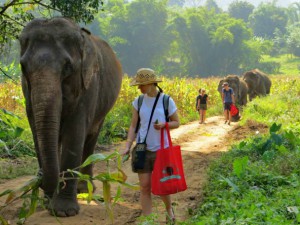A growing number of European travel agencies have decided to exclude elephant rides from their package tour itineraries based on reports of widespread animal abuse. But one of Thailand’s leading campaigners for elephant welfare argued that such move could do more harm than good to thousands of domesticated elephants already in the tourism industry.

Ms. Sangduen Chailert, an internationally-recognized elephant welfare activist, said instead of a blanket ban on elephant rides in Thailand, travel agencies from western countries that want to promote ethical tourism should engage existing Thai elephant ride operators to persuade them to treat animals under their care humanely.
“Depriving domesticated elephants and their owners of work in the tourism industry all of a sudden could possibly condemn them to even worse predicaments,” said Sangduen in an interview with ScandAsia.
“It is better to keep working elephants and issues related to their welfare visible, in the eye of animal-loving tourists and general public. It is important to keep up pressure on elephant ride operators to clean up their act.”
Sangduen heads a foundation that operates the spacious Elephant Nature Park in Chiang Mai that provides lifelong care for rescued and abused elephants while relying on those in good health to serve local tourism in an ethical and conservationist manner. No elephants are used to carry visitors or perform tricks like most tourist businesses at the 200-rai park, where more than 30 tuskers, including baby elephants, are cared for.
She stressed that although she personally objects to cruelty to and inhumane treatment of elephants, campaigning for a sudden end to the use of elephants in tourism would be unrealistic.
“Thai and international animal welfare activists, elephant owners and elephant ride operators should put their heads together and come up with a more realistic and sustainable solution that would allow domesticated elephants and the tourism-related businesses to coexist at least in the foreseeable future.”
There are approximately 3,500 domesticated elephants in Thailand. Of this, about 3,000 are engaged in tourism-related businesses while the rest are used in logging, street begging or in circuses.
The Ford Foundation in association with National Geographic named her a Hero of the Planet in 2001. The National Geographic documentary Vanishing Giants, highlighting Sangduen’s work with the Asian elephant, was recognized by the Humane Society of the United States with the Genesis Award in 2003.
In 2005, Time Magazine named Sangduen a Hero of Asia for her work in conservation.
Sangduen said elephants at her Elephant Nature Park are not required to perform any tricks to amuse tourists or to offer them rides. Instead they are simply trained to trust and feel comfortable around visitors who are allowed to feed or walk with them in the jungle or to bathe with them in the stream.
At Elephant Nature Park, animal-loving tourists are entertained simply by the opportunity to observe elephants going about their daily life in family-like herds among natural settings in the sanctuary. Visitors are advised to observe rules, including not to touch or disturb the animals or to take photos with flash on.
“We have already demonstrated that there are alternative methods in training elephants through positive reinforcement that do not require causing physical pain or mental stress to elephants. It is our belief that intelligent animals like elephants should never be forced to perform “unnatural or extreme tricks”, such as walking tightrope, or performing somersaults, or standing on a stool on hind legs or draw pictures.
“It is cruel to compel elephants to do tricks out of fear. We want to train elephants without resorting to cruel treatment the way horses are now humanely trained in some western countries,” she said. “We have already started working with some Karen (a hilltribe ethnic group in northern Thailand) mahouts in humane training and handling of elephants.”
Sangduen said Thailand has the potential to become a global centre for Asian elephant welfare and set the standard in international best practice for humane treatment of this majestic animal.
“We have centuries-old knowhow in elephant training that needs to be adjusted. As a major international tourist destination, we have the personnel and resources required to begin to work on improving elephant welfare. But it will take public pressure at the national and international levels backed by well-thought-out awareness campaigns, to make it happen.”


Lek and all of her staff and volunteers do fantastic work. The Elephants at ENP are loved and treated with respect.